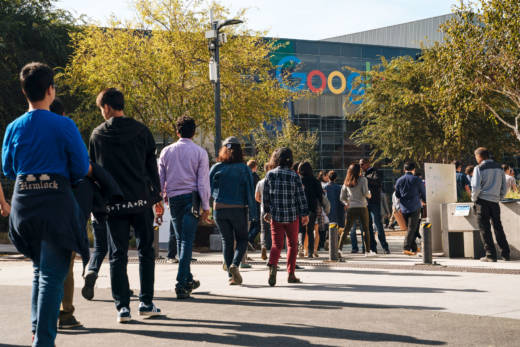At the Google walkout, Celie O’Neil-Hart demanded a number of things, including that the company put an employee on its board. “When we put our Noogler hats on,” Hart told the crowd, “you told us to have an owner’s mindset. You told us, ‘You aren’t just employees. You are owners.’ Well, the owners say time is up!”
Noogler hats are given to Google employees when they are first hired. They’re multicolored caps with little propellers. The hats embody the startup vibe of Google’s past. But today the company has over 85,000 full-time employees, and it’s close to joining Amazon and Apple as America’s only trillion-dollar corporations.
Organizing in Silicon Valley didn’t start with relatively well-paid tech employees, but instead with the industry’s shadow workforce — independent contractors. And there are tens of thousands of them. At Google they reportedly make up half the staff, doing everything from cooking to coding, but they don’t get high salaries or perks like free lunches and child care.
In 2015, contractors began organizing under a group called Silicon Valley Rising. They have achieved some things, like higher pay and unions for some bus drivers.
But it wasn’t until Donald Trump’s election in 2016 that full-time tech employees began organizing in earnest. A group called the Tech Workers Coalition emerged to complement Silicon Valley Rising. It has workers of all types, from contractors to full-time programmers.
“One of the first things I noticed when I came to the Bay Area and started working in the tech industry was the blatant discrimination and basically a class system,” said Google employee Stephanie Parker. “How people were treated along the same old lines of race, class and gender that you see in any other industry — and even more stratified here.”
As a woman of color working in the tech industry, Parker said she has often felt alone.
“My story of feeling isolated and that no one else understands, of feeling that my co-workers just want to focus on building tools and building apps and are not worried about these larger issues — that story is present in so many tech workplaces.”
Over the last year, workers at different tech firms have protested openly. At Microsoft, they spoke out against the company’s work with Immigration and Customs Enforcement. At Amazon, they criticized the company for providing facial recognition software to police departments. And at Salesforce, they held a rally against the company’s work with Customs and Border Protection.
Tech executives like CEO Sundar Pichai of Google are trying to placate workers. He spoke with The New York Times about the Google walkout, which the company eventually supported publicly.
“Moments like this show that we didn’t always get it right,” Pichai said. “We are committed to doing better and we’re listening to employees, which is part of why I think today is important.”
Some workers say they are scared of speaking up. Silicon Valley companies make them sign nondisclosure agreements and discourage them from talking to the press. At a recent protest, one worker active in the Tech Workers Coalition was afraid to give his name for fear of losing his job.
“As we start to grow and as we get stronger,” he said, “it will be easier for people to stand up and to be more public about this. For the time being, we have to carve out a way to take action that still protects us.”
He hopes the organizing is a signal to other tech workers: You aren’t alone. And he says if enough of them come together, maybe they can create workplaces that look a little more like the Silicon Valley they imagined.

